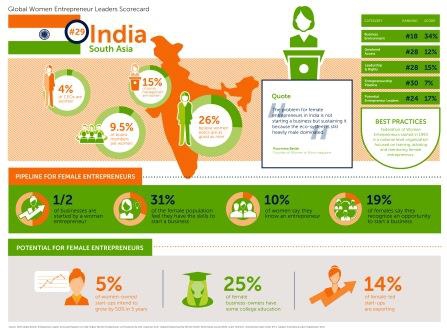India lags behind in terms of opportunities, skills, equality of rights, and access to education and the Internet.
The Indian subcontinent, which includes India, Pakistan and Bangladesh has been rated the worst market for women entrepreneurs to carry on their business, as per the Dell Global Women Entrepreneur Leaders Scorecard.
As many as 31 countries feature in this list, and India is at the 29th position followed by Pakistan and Bangladesh.
With a score card of only 17, India is way behind even countries like Jamaica, Mexico and Nigeria with a score of 49, 46 and 38, respectively. In India, very few women see opportunities or possess the required skills. In addition, they are hindered by lack of equal rights, access to education and the Internet.
The scores are based on five criteria — relative business environments, access to resources, leadership and rights, pipeline for female entrepreneurship and potential for high-growth women-owned businesses.
The new Scorecard also looks at key factors proven to unleash high-impact female entrepreneurship, and estimates the number of jobs created by women-owned businesses if they reach their growth potential.
The US ranks first with a score of 71. Even then, only 13 per cent of startups with women on their executive team and just 3 percent of startups with women CEOs received venture capital funding in the US in 2014. The study reveals that if American women started growth-oriented businesses at the same rate as men, the nation would gain an estimated 15 million jobs in two years.
More than 70 per cent of the 31 countries in the study score below 50 per cent, which implies that there is a significant growth gap between businesses owned by women and men.
The research reveals that though a larger number of women in Nigeria feel that they possess the skills and also see opportunities to start businesses, the business environment is such that it impedes the growth of these businesses. On the contrary, Japan boasts of a strong and stable business environment but very few women see opportunities or feel they have the skills to start businesses.
China, Brazil, Malaysia and Nigeria have 5 percent of the CEO positions of the largest publicly-traded companies held by woman. However, there are also countries where there are no women CEOs at all.
Poland, Jamaica and Russia are the only three countries where women comprise 35 per cent or more of the senior management and France is the lone country with women occupying 30 per cent of corporate board seats.




1 Comment
There is a glass ceiling for working women in India. Promotions are easier for men than women in the workforce and women have to try at least thrice harder for climbing the ladder. Unbelievable, but in Indian organisations, at many workplaces women are seen as a dispensable workforce when it comes to restructuring / downsizing with little regard for the work they do. Their income is seen as second income for the family, hence their services are easily dispensed with. The list of biases for women at workplace is never ending which no law can address. Organisational culture & ethics should determine that women are treated fairly at workplace with gender bias dispensed off to bring in a progressive culture.